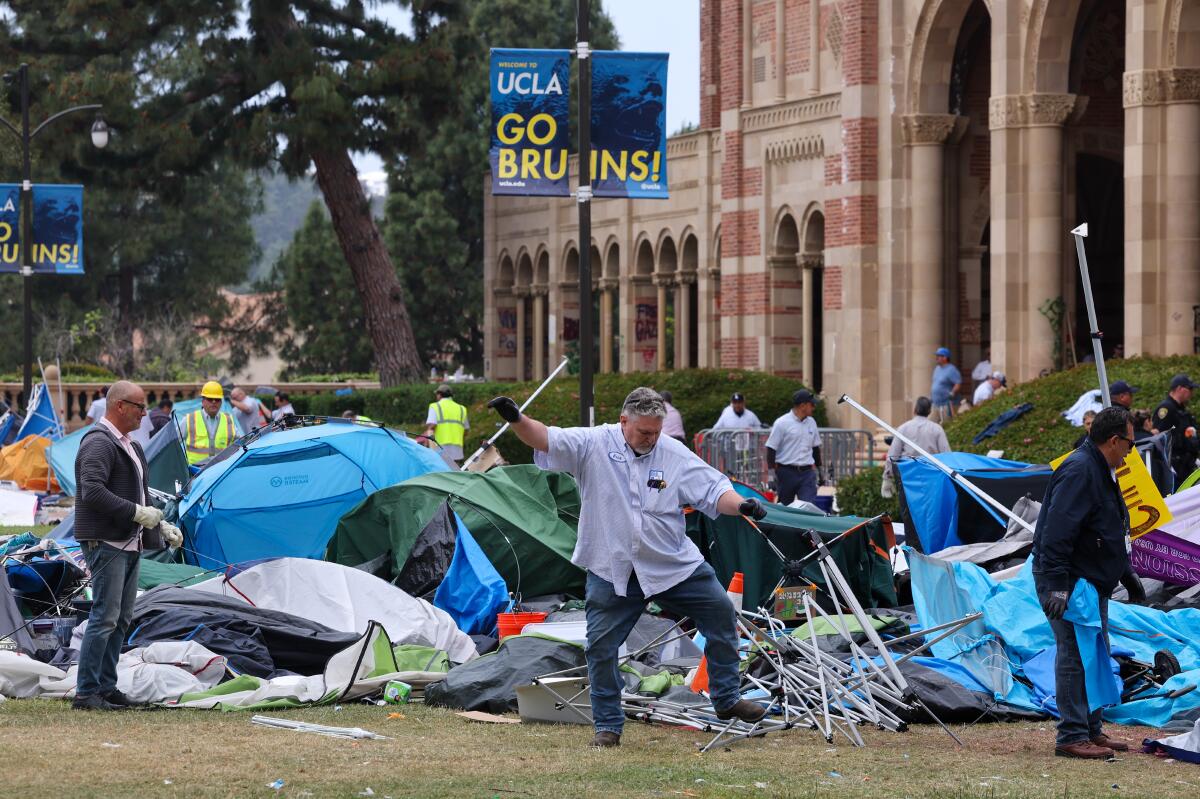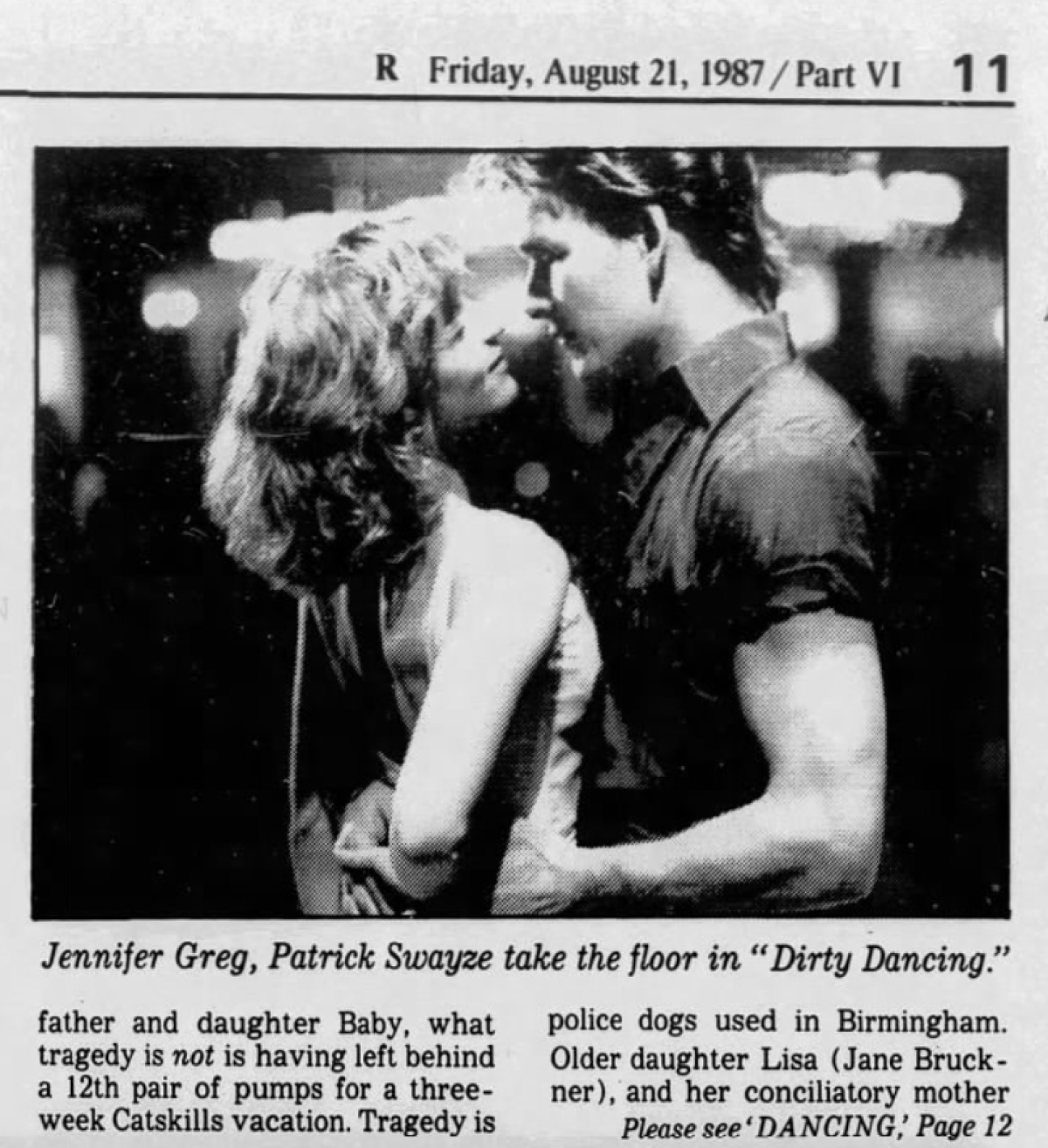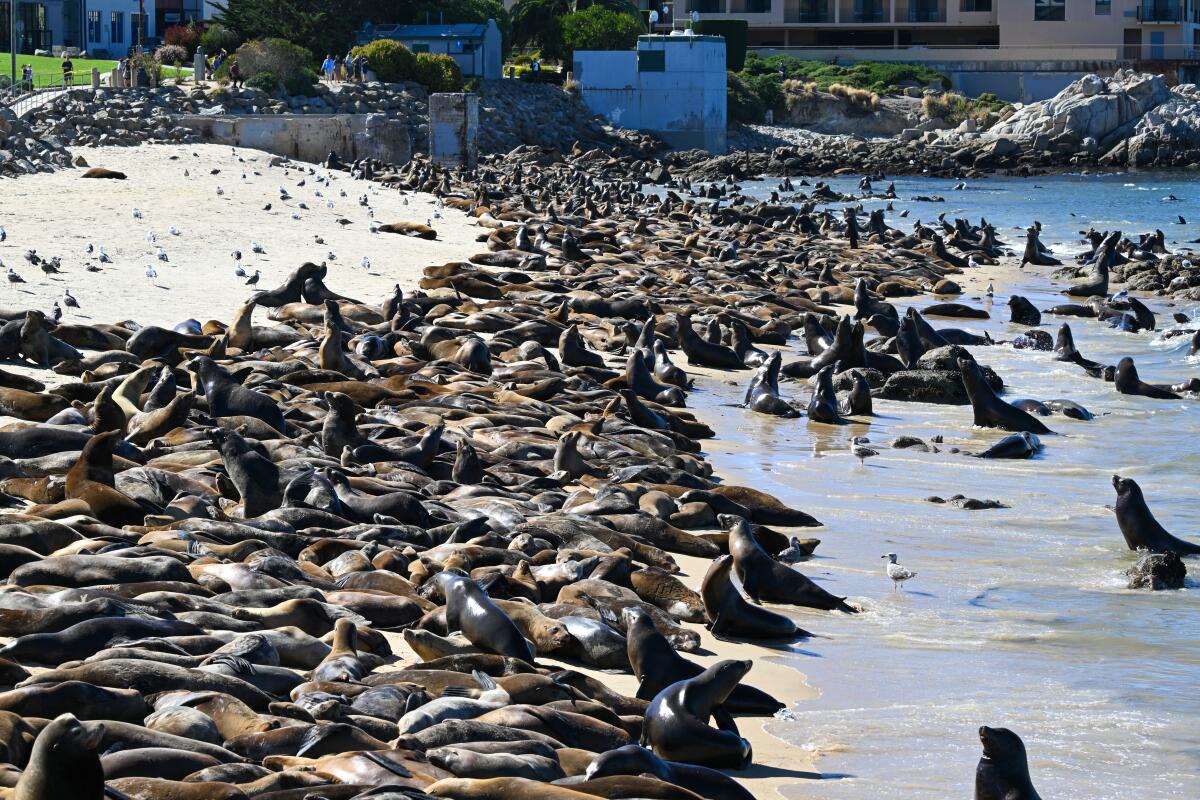UC president issues new order banning encampments, masking by protesters, blocking paths

Good morning. It’s Thursday, Aug. 22. Here’s what you need to know to start your day.
- UC bans encampments, blocking paths and masking, after new directive from system president.
- It’s Harris’ historic night at the DNC. But to many voters, she’s still “a blank slate.”
- A guide to visiting the best freshwater lakes in L.A. County.
- And here’s today’s e-newspaper
You're reading the Essential California newsletter
Our reporters guide you through our biggest news, features and recommendations every morning
You may occasionally receive promotional content from the Los Angeles Times.
UC president orders chancellors to strictly enforce protest rules
As thousands of University of California students begin to return to school this week, UC President Michael V. Drake directed the system’s 10 chancellors to enforce policies prohibiting encampments, demonstrations that block access to pathways and buildings, and masking that shields identities.
Drake also shared a letter with the UC community Monday, reaffirming the system’s commitment to nurturing free speech, diverse viewpoints and lawful protests — fundamental to the university’s mission. The directive comes amid sharp calls to stop the kind of policy violations that unfolded during demonstrations over the Israel-Hamas war roiling UC and other campuses across the nation in the spring.
As the birthplace of the free speech movement, the “vast majority” of campus protests are peaceful and nonviolent,” Drake wrote. But, he added, “some of the activities we saw over the past year were not” and needed to be addressed through “consistent application of policies and laws.”
At several UC campuses, demonstrations escalated, provoking counterprotesters. At UCLA, a violent mob attacked the camp during a night of violence and a delayed police response to it. Community members complained that the encampments disrupted campus operations and building access.

What’s at stake?
In his letter, Drake instructed chancellors to provide a document or webpage compiling existing policies that apply to protests and demonstrations by the beginning of fall term — this month at UC Berkeley and UC Merced, and in September for the rest.
“I expect that most of our campuses have existing policies that cover the areas listed,” he wrote, but if they don’t, campuses should “develop and/or amend” their policies as soon as possible.
If policies are violated during demonstrations, chancellors should use UC’s “tiered responses,” Drake said, and community members will be provided with “multiple opportunities to adjust their conduct.”
All UC members cited for violations will go through the campus disciplinary process, Drake added, which include warnings, probation, restitution, suspension or dismissal for students; written censure, demotion, suspension without pay and dismissal, among other sanctions, for staff and faculty.
A top-down presidential directive is unusual in a system that respects the independent decision-making of its chancellors. Drake consulted with campus leaders, students, faculty, staff, regents and others over the summer to strengthen and clarify UC’s approach on protests going forward.
He also emphasized that the descriptions used in his letter “are intended to be illustrative” and that the policies chancellors uphold “may use different language to achieve the same effect.”
Why now?
Drake’s letters respond to criticism the system received from some regents, faculty, legislators and others that the demonstrations had become dangerous and costly, and that UC needed to enforce campus rules more consistently.
Across the UC, the cost of protest management reached $29 million, my colleagues Teressa Watanabe and Jaweed Kaleem reported. Most of that was spent on outside law enforcement and security officers as well as property repairs, graffiti and waste removal as well as pest control.
Lawmakers urging Drake to develop a “systemwide framework” to provide consistent enforcement of rules are withholding $25 million in state funding until he delivers a report on his efforts by Oct. 1.
The regents, who had similarly pushed for the systemwide action, praised Drake for his “clear direction,” said Regent Rich Leib, who served as board chair last year during the protests, said.
What has been the response?
Rabbi Dovid Gurevich, the director of Chabad at UCLA, said that the directive was “received overall positively in the community” and that it was a necessary response to a “tough three months” at UCLA.
“Students we’ve interacted with felt harassed, verbally assaulted,” Gurevich said, adding that while he was recording a video on Instagram in June, anti-Israel agitators, unaffiliated with the university, were verbally abusive to him.
Some pro-Palestinian students and faculty condemned the directive and said they won’t be deterred from protesting when they return to campus.
“This latest attempt is nothing more than the UC’s desperate effort to break the will of our movement,” said Banan Abdelrahman, a spokesperson with Berkeley Students for Justice in Palestine.
“Time and time again, we have seen how this repression fails,” she said. “How can you silence us when for 11 months we have witnessed the live slaughter of the Palestinian people — for many of us, our people.”
Today’s top stories

Kamala Harris prepares for the spotlight
- It’s Harris’ historic night at the DNC. But to many voters, she’s still “a blank slate.”
- Tim Walz was a staunch LGBTQ+ ally, long before it was common.
- Potential presidential hopefuls court California Democrats.
- More than 200 social media influencers were given credentials for the DNC.
Electric bills are soaring in Southern California after record heat
- Some residents are frustrated with their costly electricity bills. Here’s how you can beat the heat without busting your wallet.
- The rising costs come after California recorded its hottest month ever in July.
- In other climate news, California lawmakers are sounding the alarm over a “financial catastrophe” if oil well rules aren’t enforced.
Shining a light on L.A. government
- Officials at the Los Angeles Department of Water and Power attended a fancy conference. False invoices paid their bill.
- Los Angeles County got $88 million to rehabilitate young people. Most of it hasn’t been spent.
More big stories
- Robert F. Kennedy Jr. is reportedly on the verge of dropping his presidential bid.
- As reality TV takes a hit amid a slowdown in Hollywood, crew members lament the loss of jobs to “runaway production,” cutbacks and consolidation.
- Life expectancy in California fell by more than 8 months in 2021 even as COVID-19 vaccines became widely available, a new CDC report found.
- A Black female arson investigator said she faced discrimination and retaliation within the Los Angeles Fire Department.
- Jessie Peterson seemed to vanish from a Sacramento-area hospital last year. Now, her family alleges the hospital failed to tell them she died.
- Fed up with having her mail stolen, a Santa Barbara County woman sent herself an Apple AirTag to help catch suspects — and it worked.
Get unlimited access to the Los Angeles Times. Subscribe here.
Commentary and opinions
- The Obamas are done turning the other cheek — and Democrats couldn’t be happier, Mark Z. Barabak and Anita Chabria write.
- Fans thought the media would be softer on Bennifer 2.0. They were wrong, Maira Garcia writes.
- The Dodgers hope Walker Buehler can pull off the impossible, but he’s struggling, Dylan Hernández writes.
- And from the Times Editorial Board: Delay California’s oil drilling protections until 2031? No way.
Today’s great reads
The kidnapped heiress who became an “urban guerrilla” and embraced her captors. Patricia Hearst’s transformation into a fervent member of the SLA was part of a strange saga at the nexus of leftist militancy and American aristocracy, saturation media coverage and youth revolt.
Other great reads
- TikTok creators, inspired by Reesa Teesa’s “Who TF Did I Marry?!?” series, are using the app to share multipart stories.
How can we make this newsletter more useful? Send comments to [email protected].
For your downtime
Going out
- 🚣♀️ Here’s a guide to visiting the best freshwater lakes in L.A. County.
- 🫱🏽🫲🏻 Looking to make new friends? Here’s how six SoCal residents bridged age gaps to find buddies outside of their generation.
- 🦭 Sea lions are taking over a beach in Monterey’s Cannery Row.
Staying in
- 📺 “Pachinko” returns Friday with Season 2 on AppleTV+.
- 🎶 The runaway success of Kendrick Lamar’s “Not Like Us” is the latest feather in the cap for hip-hop producer Mustard.
- 📺 K-pop group Katseye, the focus of a new Netflix documentary, has an L.A fashion fairy godfather who helps make their dreams — and looks — come true.
- 🧑🍳 Here’s a recipe for marinated feta with spice-roasted tomatoes and grapefruit.
- ✏️ Get our free daily crossword puzzle, sudoku, word search and arcade games.
And finally ... from our archives

“By being smart and funny, touching and unabashedly sensual, ‘Dirty Dancing’ (selected theaters), a musical/love story set in the Catskills in the early ‘60s, is the sweet sleeper of a hot season.” So wrote L.A. Times film critic Sheila Benson on this day in 1987 when “Dirty Dancing” first came out. Read her full review here.
Have a great day, from the Essential California team
Ryan Fonseca, reporter
Defne Karabatur, fellow
Andrew Campa, Sunday reporter
Hunter Clauss, multiplatform editor
Christian Orozco, assistant editor
Stephanie Chavez, deputy metro editor
Karim Doumar, head of newsletters
Check our top stories, topics and the latest articles on latimes.com.
Sign up for Essential California
The most important California stories and recommendations in your inbox every morning.
You may occasionally receive promotional content from the Los Angeles Times.






